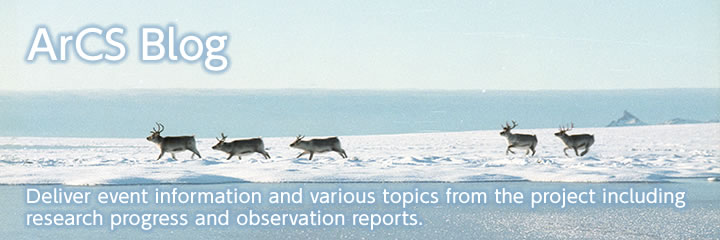Now, I am in Netherland, Dr. Maarten J.J.E. Loonen's Laboratory at University of Groningen for nine months. This summer I stayed in Spitsbergen Island, Norway, with Dr. Loonen and the member of his team for two months.

A regular meeting of Sustainable Development Working Group (SDWG), which is one of six working groups of the Arctic Council, was held at Inari in Finland from 21st-22nd September 2017.
During this summer‘s cruise of the Japanese research vessel R/V Mirai extra radiosondes have been launched as a contribution to YOPP. As part of the Japanese research project Arctic Challenge for Sustainability (ArCS), extra radiosondes were launched every six hours over the ice-free Chukchi Sea during September 2017 aboard the R/V Mirai (Figure 1, 2.)
The Expert Group on Black Carbon and Methane (EGBCM) held its 4th meeting in Helsinki, Finland on October 3-4. 2017. A summary of this meeting is given below.
Arctic Monitoring and Assessment Programme (AMAP) 31st Working Group meeting was held between September 12-14 in Reykjavik, Iceland. Eight Arctic States (Canada, Denmark, Finland, Iceland, Norway, Russia, Sweden, and US), three of six AC permanent participants (indigenous peoples’ organizations; ICC, AAC, and Saami Council), six AC observer countries (France, Germany, Italy, Japan Netherlands, and Rep. Korea), and related organizations such as PAME, CAFF, Arctic Economic Council, European Commission, IASC, and ICES, participated in this meeting.
As a part of ‘theme 6’ ecosystem and biodiversity research program, we conducted a survey of terrestrial biological diversity, from early July to late August 2017, in Salluit, Quebec, Canada. The purpose of this survey is to clarify diversities of plant and microorganism in the ecosystem of the Arctic tundra.
The CAFF board meeting was held at Bethel, Alaska, USA. A closed meeting was held on September 5 at Anchorage and meeting which can join observers was held on September 6 and 7 at Bethel, Alaska. This meeting was the first time for US chairmanship. PhD. Cynthia Jacobson of U.S. Fish and Wildlife Service to be appointed chairperson. About 40 people joined the meeting including board member from Arctic countries, Permanent Participant organizations (PPs) and observers.
How can science, which objectifies the natural environment by separating it from humans, and indigenous knowledge or traditional ecological knowledge (hereafter “local knowledge”), which understand humans as beings that are closely tied to nature, coexist and collaborate?
The above question can often be heard in recent years in the field of Arctic research. The thinking that separates science and local knowledge into two opposites has to do with how humans and nature are interpreted. Science views the relationship of man and nature in dualistic terms and attempts to understand it in a reductive, objective, analytical and mechanistic way. In contrast, local knowledge tends to understand that relationship monistically, in a holistic, intuitive, experiential and spiritual way.
The oceanographic observations in Bowdoin Fjord were conducted by our research group in the summer 2017.
During our stay in Qaanaaq for a field campaign at Bowdoin Glacier and Fjord, we organized a workshop with local people in Qaanaaq. The event was held on 30th July 2017 at school in the village.




